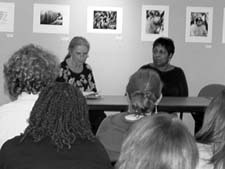“You have to know this history. If you are going to get a Guilford College diploma, you should be proud of it.”
These are the words of James Shields, Director of Community Learning, who spoke last Monday, Nov. 3, at a forum outlining the history of integration at Guilford College.
Shields presented the history of race relations at Guilford and then turned the floor over to members of the history committee of the anti-racism team.
Shields talked of a school that was slow to integrate. In the 1960s African-American staff, members were getting paid only $1.45 an hour, wages that lagged behind those of other schools.
In 1961, Guilford College would deny admission to African American applicants. One woman was told her application could not be considered as Guilford’s admission policy did not allow it to admit members of “the Negro race.”
After this woman was denied admission to Guilford, there was pressure from the NAACP and the Quaker Friends to end this policy of discrimination. Guilford claimed that it had no policy of discrimination and that the only solution was that black students be admitted to Guilford College very soon.
One male African-American student was admitted in 1962. In 1968, in order to start creating a diverse student body, Guilford admitted 28 African American men and women.
Alex Stoesen, a retired Guilford history professor, was the first member of the history committee to speak. He admitted that although the saying, “the Quakers are the conscience for the state of North Carolina” sounds good, Guilford College doesn’t work that way.
Stoesen believes that although the Quakers were against slavery before the Civil War, after the Civil War they felt victimized and subsequently did not give the issue of racism the attention it deserved.
The following two speakers were both women who had attended Guilford College in 1969. They even had taken a class together. However, because Judy Harvey is white and Minnette Coleman is black, their experiences were very different.
Harvey, now the Director of Multicultural Education, loved Guilford.
She said the faculty was attentive. They checked on her when she was sick. When a rumor circulated Harvey was using drugs, three faculty members called her. She took a class about race relations her freshman year and was upset, agitated, and saddened by it, but also enlightened.
Guilford, Harvey said, planted the seeds.
No one even bothered to tell Coleman when school started. No one called her to tell her what dorm she was in.
During her first year, she said, something was always going on. She spoke of ‘Brother and Sisters in Blackness’ meetings in a condemned building, a sit-in in Founders Hall, and writing a letter to The Guilfordian when the civil rights leader Floyd McKissick came to speak and was not given the same treatment as white speakers were.
Lauren Reed, a junior, said of the forum, “the dichotomies the two Guilford graduates talked about in their experiences was really powerful – one was nurtured into action, the other had no choice.”
The final forum hosted by the Anti-Racism Initiative will be in Dana Auditorium at 7:00 p.m. on Monday, Nov. 17. Peggy McIntosh will be a speaker at the forum, which will focus on the topic of white privilege.

